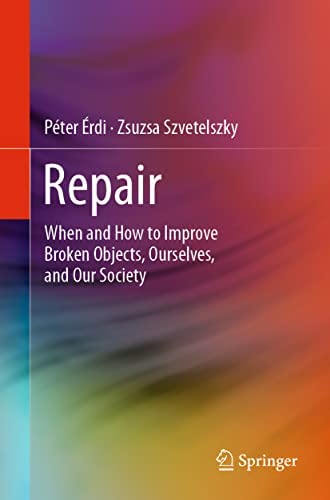
is a co-author of “Repair: When and How to Improve
Broken Objects, Ourselves and Our Society.”
If you’ve ever asked yourself whether to “repair or replace” certain possessions or facets of your life, a new book co-authored by Kalamazoo College Luce Professor of Complex Systems Studies Péter Érdi is for you.
Érdi and co-author Zsuzsa Szvetelszky have released Repair: When and How to Improve Broken Objects, Ourselves and Our Society. The book, available through Springer, provides a new way of thinking about managing resources through integrating the perspectives of social psychology with complex systems theory, which is concerned with identifying and characterizing common design elements that are observed across diverse natural, technological and social complex systems.
By resources, the authors mean objects, such as cell phones and cars, along with human resources, such as family members, friends, and the small and large communities to which they belong. Their hope is that readers will understand how to repair themselves, their relationships, their communities and contribute to repairing the world.
The authors say the book is offered to Generation Z, which is growing up in a world where some aspects of life seem to be falling apart; people in their 30s and 40s, who are thinking about how to live a fulfilling life; and Baby Boomers, who are thinking back on life and how to repair relationships. Reviews have said the book is an intellectual adventure of connecting the natural and social worlds to understand the transition of going from a “throwaway society” to a “repair society.”
“Repair is supposed to be a general interest book,” Érdi said. “It converts scientific theories to conventional applications by raising and answering questions like, ‘when should we attempt to repair something, and when is it better to save one’s energy and let things go?’ We wrote the book with my Hungarian social psychologist, co-author Zsuzsa Szvetelszky, intending to explain how to live a resilient life and design resilient technological and social systems at small, intermediate and large scales.”
Érdi also wrote the 2019 book Ranking: The Hidden Rules of the Social Game We All Play, which examines how and why humans rank certain aspects of life and how those rankings are viewed. That book has been published in seven languages including German, Chinese, Japanese, Korean and Hungarian. Further, Érdi has been a prolific researcher with more than 40 publications published since joining K. In that time, he has given more than 60 invited lectures across the world, and he received the 2018 Florence J. Lucasse Fellowship for Excellence in Scholarship, honoring his contributions in creative work, research and publication. He also has been the editor-in-chief of Cognitive Systems Research and served as a vice president of the International Neural Network Society.
Plus, more publications by Érdi will be available in the near future.
“It happens that I’ve signed a contract with Springer for my subsequent book Feedback: How to Destroy or Save the World,” he said. “There is a narrow border between destruction and prosperity. To ensure reasonable growth but avoid existential risk, we need to find the fine-tuned balance between positive and negative feedback. The book will offer a non-technical intellectual journey around the application of feedback control to the emergence and management of crises from dynamical diseases to natural and social disasters.”
